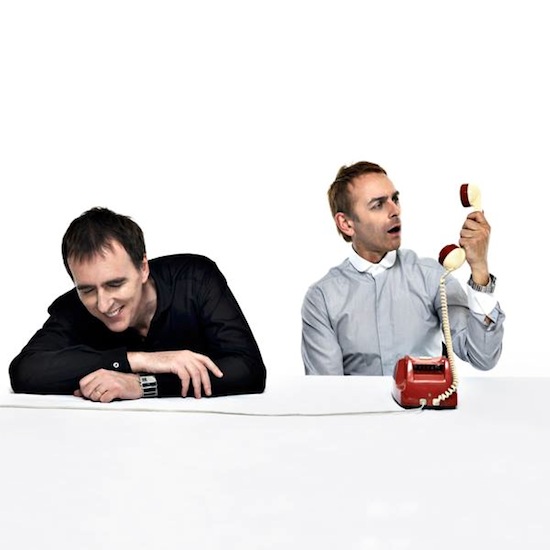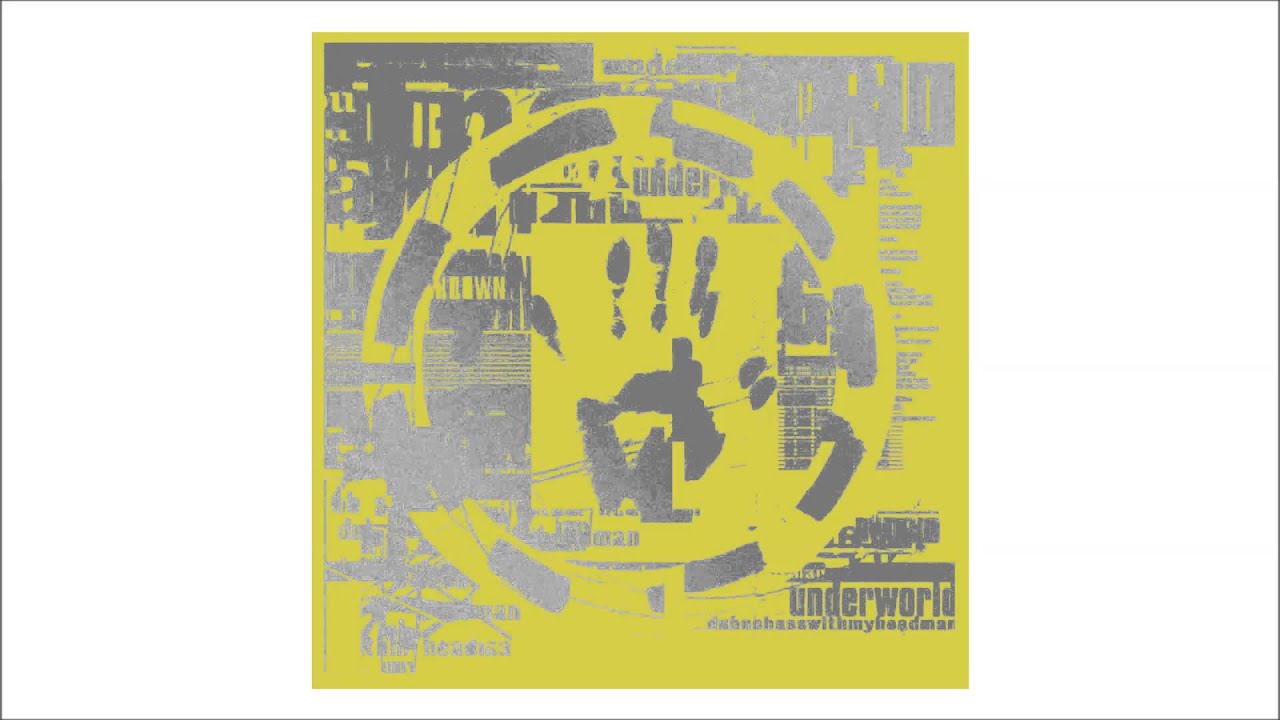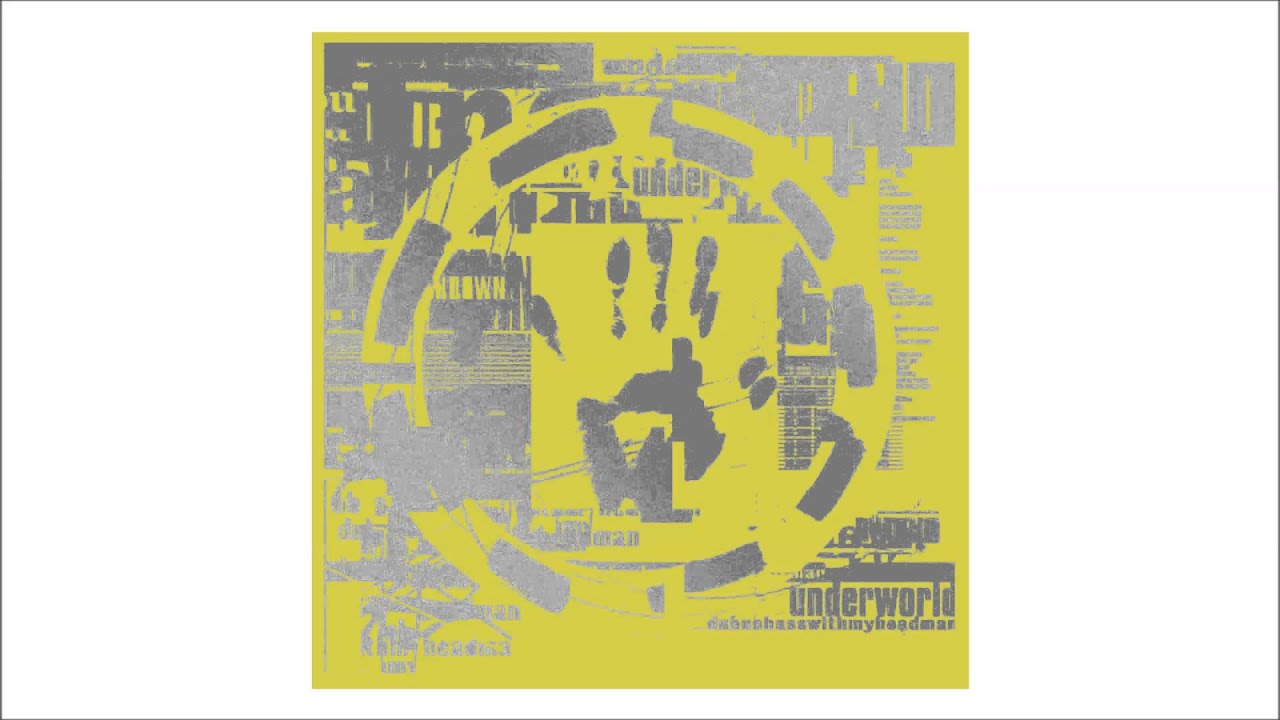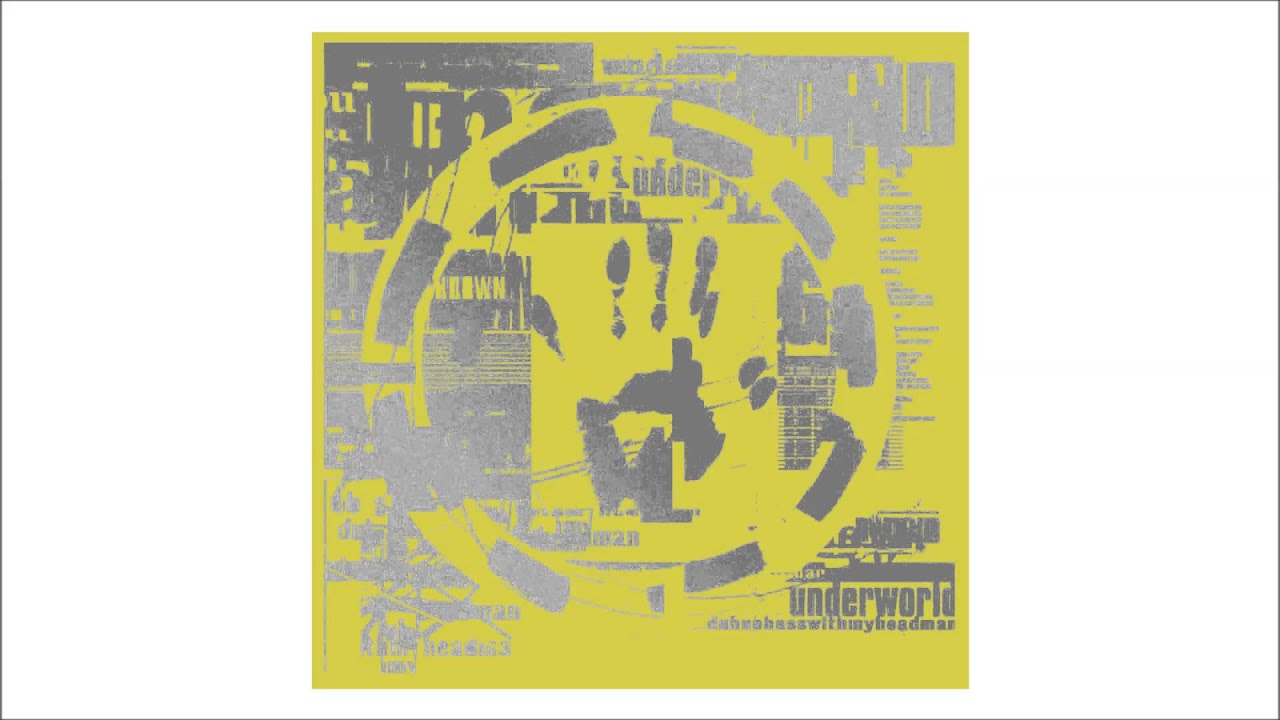When the first incarnation of Underworld (in the words of Karl Hyde, a "rocky, poppy, funky group") came to its natural conclusion after a 1989 tour of North America as the support act to Eurythmics, Rick Smith returned to Britain and set up a small studio in his terraced house on Kyme Road in Romford, Essex. Both Smith and Hyde, his musical partner in crime, had become intoxicated by acid house. ("We’d heard it on the radio and we wanted to do it," Hyde told me during our interview for his Baker’s Dozen.) But before Hyde could get on with "doing what was in my heart", he had to get the whole being a rock star thing out of his system once and for all. A stint as a session guitarist for Blondie’s Debbie Harry was to be his last hurrah in a traditional rock group, but it was to also have a huge influence on the next phase of his musical life.
"I was with Debbie in New York. We were recording at Electric Ladyland studios and I was living in the famous Gramercy Park Hotel," Hyde told a journalist in 2010. "After work finished for the day, I’d walk the streets late at night and write lyrics. A lot of the classic tracks from Dubnobasswithmyheadman – things like ‘Mmm Skyscraper… I Love You’, ‘Dirty Epic’, ‘Dark & Long’ – were written that way, while I was working for Debbie."
In the meantime, Smith had recruited a talented young DJ, Darren Emerson, to help the pair to realise their vision. With Hyde back in the UK, they began immersing themselves in club culture, in venues such as London’s Soundshaft and the Milk Bar, watching Emerson expertly take the ecstatic crowd on a sonic journey pitched to perfection. After all-night sessions, they’d return to Smith’s studio and concoct their own revolutionary take on dance music.
"It came together really quickly," Smith has said of ‘Rez’, a non-album track released in 1993 where emotive alien bleeps ride a thunderous tidal wave of percussion. "I’d been out the night before, and I was feeling quite tribal. I started messing around with the synthesiser and the sequence that you hear on the record tumbled out straight away. It was just so sweet that I knew what to do immediately."
From these fruitful sessions, the nucleus of what was to become Dubnobasswithmyheadman emerged, the first album from Underworld Mk.2. The completed work was "a claustrophobic, black-as-night procession of startling modern techno" (from The Guardian‘s 1000 albums to hear before you die). In spirit it was equal parts ecstasy and melancholy, with Hyde’s hypnotic, surreal stream-of-consciousness lyrics juxtaposing the alienation of urban life with the hedonistic rush of late-night excess. The common complaint at the time was that dance music, and techno in particular, was faceless – Hyde as ersatz frontman gave Underworld a unique edge.
In a 1993 interview with Melody Maker, Hyde explained the process and ethos of Underworld, neatly encapsulating why the album and its creators have stood the test of time: "We’re grabbing elements from all different times and areas of music and taking them somewhere else. We don’t want to simply regurgitate the past, and even though we’re using vocals and guitars, we’re trying to do it in new ways. We’re trying to find ways to make those elements relevant to today."
The reviews for Dubnobasswithmyheadman, released on independent label Junior Boy’s Own in January 1994, concurred with Hyde’s assertion that this was a seismic step forward for dance music. "This breathtaking hybrid marks the moment that club culture finally comes of age and beckons to everyone," said Ben Turner in Melody Maker. A year later he would start dance specialist title Muzik, helped in no small part by Underworld and their contemporaries, who included Leftfield and Orbital, smashing down the barriers.
It wasn’t just the music that was groundbreaking – way before the rise of the internet, Smith and Hyde, fuelled by their involvement in the art and design collective Tomato, recognised the power of creating multimedia events. Their live shows incorporated film, music and visual art, the instantly recognisable aesthetic of which could also be found on the album artwork for Dubnobass…, which according to the 2008 book The Greatest Album Covers Of All Time, "set a new standard of presentation for subsequent dance albums."
For such a revolutionary record, it is strange to the point of irritation that the album rarely gets a mention, with the Underworld story for most people starting with ‘Born Slippy’ appearing on the Trainspotting soundtrack in 1996. With all the recent kerfuffle surrounding the 20th anniversary of Britpop, Underworld and Dubnobasswithmyheadman didn’t get a look in. Not that they are in any way, shape or form a Britpop band, but the album has had more of an influence on the shape of modern music than any of Britpop’s finest, with dance music in all its myriad forms no longer solely an underground concern.
I met up with Smith and Hyde at the Heavenly Social bar in London’s West End to discuss Dubnobasswithmyheadman 20 years on, how it feels for such a forward-thinking band to be taking the nostalgia route and what to expect from the forthcoming one-off live show at the Royal Festival Hall, where they will try to recreate the album in its entirety.
What do you remember about the genesis of the album?
Rick Smith: I was living in a terraced house on Kyme Road in Romford. I had a home studio but it was very basic. This was the early days – there was computer audio recording equipment and hard drives, but it was all incredibly expensive for the likes of us. We were working on remnants of old equipment that we’d had since the 80s. We had some nice bits and pieces. A 909 drum machine, an ARP 2600, a Moog, vocoder and then an Atari computer. In some ways it was a fusion. The home studio thing had been around a while, but it wasn’t taken very seriously. It was a financially driven thing for me – I couldn’t afford to go in a proper studio. If you’re going to do a remix, and you get given £1,500 you can’t afford to blow £1,000 of it on a studio. And having my own studio tied in with my desire to teach myself some new skills.
When we were making the album there was a definite idea that 12"s would do what album tracks wouldn’t, but at the time as well as making the 12"s I was doing music for advertising, remixing, I was writing ambient music – I don’t know why, I was just writing. Some of the thinking for me with the nature of these longer pieces, these journeys, was going to places like Milk Bar where Darren was playing, hearing him drop things, do things, seeing the way that the audience reacted and then trying to make one record that did what three records could do. I was following my instinct – they were journeys.
It must have been quite liberating as you didn’t have any time constraints.
RS: Definitely. That aspect was liberating. You could take six months if you wanted, it didn’t matter.
What was the day-to-day routine when you were recording? Were you living together or just coming together to write?
RS: No, we lived in different places. It’s difficult to sum up a particular method or mode of working – even within that one album, there were very different ways of approaching a tune. Sometimes they were born of aggravation. There were a couple of pieces on the album where I can remember being really annoyed at Karl because he wanted to write "something" and I really didn’t want to. But we did. And some things came together really quickly – like ‘Dark & Long’, ‘Dirty Epic’… The large seed of the idea was there straight away. But other tunes weren’t like that. They took a lot longer. Sometimes it took months for it to come together.
Was the idea always to make an album?
RS: No. In fact the idea came to make an album came when about two thirds of the songs were already there. Before that it was just about making music.
Were you surprised when you came to format it that it all came together so well?
RS: Aspects of the formatting were… well, the way the album sits as a piece and flows is a little bit of happenstance, but also some very deliberate decisions. There are pieces like ‘Surfboy’, where an instrumental nature was needed if the album was going to run like this, things like ‘Tongue’ that just seemed to be necessary if we were going to make the album breathe as a whole. So certain tracks themselves are a journey, but the whole album is as well. Steve Hall from JBO was very helpful like that. You can get a bit wrapped up inside it. He’s a clever guy. We’d finished ‘…Skyscraper’ when we met Steve.
Was that the first song that was completed for the album?
RS: No, funnily enough, the first song we finished was ‘Mother Earth’, which was the B-side of ‘The Hump’. We didn’t even have a name when we made ‘The Hump’ – that just came out on Tomato Records. We were just playing around really, breaking little rules.
I don’t think it’s overstating the point to say that Dubnobasswithmyheadman changed the way I listened to music. Up to that point, everything was very compartmentalised – that’s a dance track, that’s indie, that’s a headphones song, that’s a film score – Dubnobass… merged so many things together that it had a profound influence on how I went about consuming music.
RS: We were all very surprised when ‘Mmm… Skyscraper I Love You’ came out. We’d done a raft of remixes because the track itself didn’t seem to be club friendly, but then DJs were playing the album version. That was the first time when I realised that there was more to this than just a cerebral, album experience – it worked on another level as well.
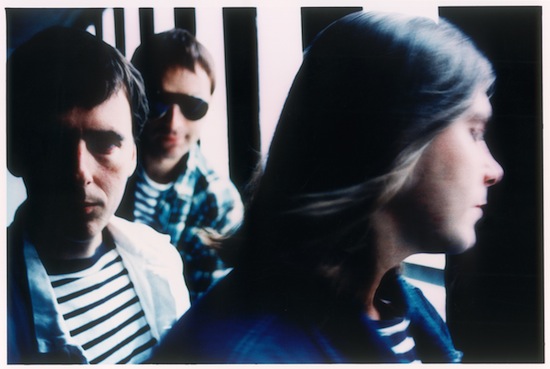
Karl, what can you remember about your vocal contributions to the album?
Karl Hyde [quietly]: It was somebody else.
Is that how it feels now?
KH: [laughs] Yes.
Were the instrumentals already down before the lyrics were recorded?
RS: Both. Sometimes things were in place; sometimes quite the opposite. ‘Dirty Epic’ was one of those ones where Karl was being aggravating and wanting to write, so we plugged up – with me probably whinging – and it all happened very quickly. We didn’t do vocal repeats at the time. We’d had enough of that in the 80s – y’know, doing a vocal take and re-recording it and saying, "Oh it’s great, apart from that bit." It became much more about, "That’s the moment, now deal with it." But that’s not to say that everything was perfect. Some things that we did didn’t make the grade, but often it was a big success.
KH: We’d come from a place where frontman-orientated bands were quite domineering. That time was not about that for us – we’d tried that. It would be easy to say it was opposite – the singer at the back and the rhythm section at the front. That’s a very simplistic way of putting it, and I think if I’ve ever said that, it’s in hindsight. It’s quite a neat way of looking at it, but really there was a lot of open-minded – especially from Rick’s point of view – experimenting with a singer again. That wasn’t something that was particularly prevalent at that time [in dance music]. It wasn’t cool or considered to be the thing to have, so how do you incorporate a voice? But there was a non-preciousness between us. You can chop something out – it doesn’t matter if I think something sounds good, if Rick doesn’t, just chop it out. There might have been the odd disagreement, but ultimately it was like, "Look, it’s down and it sounds good and if you want to leave it in, great, but if it sounds good and you want to do whatever you want to do with it, great." And Rick would reinvent things with my voice as a source.
It became another instrument, almost.
KH: Well, it was. We’d said this for a long time, y’know, "Why do singers always sing with the same bloody voice?" They just get older not being able to sing like they used to. Why do they hang on to it, when the human voice is such an interesting creator of sound? I think it’s quite noticeable on that record, either through processing or approaching it differently, rather than holding on to that signature sound.
Was making the record a harmonious experience?
RS: You’re gonna get different answers now, especially looking back 20 years. We all reinvent little bits of it and also it’s your own perception, y’know, you see out from the space that you occupy and you can try and empathise, but… harmonious? No. There were moments of harmony, but also moments of disagreement. Harmonious would be quite far from how I think it felt. It felt like something existing born of struggle and a very personal idea. And with enough room to accommodate each other… and some good laughs. But Karl and I weren’t a couple of 17-year-olds who had just met and said, "Hey, let’s make a band." It wasn’t like that. Darren came from a very different place.
How did Darren fit in to the existing dynamic of Underworld?
RS: Well, come Christmas 1990, when there was this big shift of focus for Karl and I, and the end of an era really, it wasn’t really a question of him fitting in. It was a new thing. It was like starting all over again. There was a sense of "I wanna piece of that" from all the participants. We all had something to bring that was uniquely us.
Could you identify what that was, as individuals?
RS: Yeah, you can do – it’s kind of obvious in a way, but be careful that doesn’t just tidy things up… Darren was a DJ, a very good DJ. Karl was a singer and a lyricist and guitar player. And me? I just make records. There was a very interesting dynamic, which I liked, but was very hard work. I was working with two frontmen and that had a really interesting energy. And I think the fact it was the three of us rather than just Karl and I at that time was a really good thing. Ultimately, I think, we all ended up doing what we wanted to do because there was no particular direction. I could obsess about making the records all I liked, but as I said, there would be days when Karl would come in and really want to make something new. You can’t plan those situations. There’s no template. There’s luck involved and a personal commitment, and if you can glue all of that together you can get something interesting. But even if it’s interesting there’s no guarantee that it’s going to touch tens of thousands of people. An awful lot of stuff gets made in the world and just… disappears.
It didn’t sound like anything, certainly that I’d heard before, and for that reason it felt like the start of something, rather than fitting in with something that already existed. That’s why it’s such an influential record.
RS: You obviously don’t know that at the time. We wanted to be different and we wanted our own identity, as individuals…
KH: We were awkward as well – individually and as a group. The people we hung out with were awkward. They didn’t want to fit in. Not to cause any problems, just because there were a lot of people already doing that, so the people that we gravitated towards were people who didn’t want to follow on and copy – they wanted to have a voice of their own. So whether that was us, or Tomato, or Junior Boy’s Own – the people we were around were of that mind and encouraged us a lot.
RS: Dirk van Dooren, one of the original Tomatoes, when we all got together he said, "I want to make good work and get paid well for it." That really resonated for me at the time. I was almost on the streets due to lack of funds, but still today it’s the truth, because it’s the order of it: "I want to make good work and get paid well for it." As opposed to doing jobs – making average work and getting paid well for it. Underworld was not meant to be a cash cow – it was art, music, expression.
It must be amazing now to see where that took you. Lots of people have those intentions and that honesty but it ends up with nobody hearing it.
KH: There was a sense of circumstances as well – that album might have been about to be made by a number of people. Or, at least, an album like it that brought certain tribes of people together. There was change – we’d already had Screamadelica and the Happy Mondays. Dance music was growing and widening in its appeal, and I think Rick happened to stitch it all together in a way that worked. It had a place on the dancefloor. I can remember us playing at Soundshaft out the back of Heaven – it was the second gig we did – and we were setting up on the kind of balcony, and a friend of ours remembers as we got a guitar out of its flight case, somebody down below went, "Oh, not a fucking guitar!" And yet, later on that night everybody was dancing. The music made things that were wrong appealing. So we could carry on being eclectic and calling on film music and reggae and rock, as well as electronics and Kraftwerk, and the way Rick put the records together opened up a door for people to find a way in.
With the reissue, there’s a lot of material that hasn’t been available before and the thing that is most interesting to me as a long-term fan is the live session/jam from Kyme Road [on CD 5]. Is that representative of how you worked, and how songs came together for the album?
RS: That was really early on. It came about partly technically because of the limitations and how little equipment we had at that time, but also this sort of pollinating of a bit of this song, a bit of that song, a bit of bass from that, a drum beat from that and that now sounds like that and you take that out and add that bit and it sounds like that – all through necessity. We didn’t even really have the material at the time to invent in the moment with the technology in that way, so things came out like they did.
It’s interesting because Dubnobass… sounds like such a considered studio album, so to hear the raw elements of the record in a live environment is really exciting.
KH: At that time we were playing in quite an improvised way and it became more improvised. We weren’t rehearsing and we weren’t going in with a set list. We watched DJs start with an idea and then bounce off the crowd and our improvisations might go on for a really long time before it became apparent what we were doing. At some points, elements of different tracks might be played over each other to make something else – sometimes because I couldn’t remember what I was doing!
How do you feel looking back at the album now? Underworld is definitely not a heritage act – you’re still making great music. You don’t need to go back in time…
RS: It’s complicated. Personally, it’s not a very nice thing, but it’s also a lovely thing. I’m very grateful it’s that album and not… others that we’ve made. I’ve become obsessed with trying to recreate the impossible [for the live date at the Royal Festival Hall] and getting very anal about sounds and moods – it’s been an interesting journey, seeing what we can do with it live.
KH: We’ve started rehearsing and trying to put it all back together again. It’s a bit like a Lego set – what goes where?
RS: It won’t be a jazz gig. We won’t improvise to the degree that we did at that time because that would be a bit weird.
KH: Not at this point at least. We want to do some things we’ve never done before – we’ve never performed an entire album.
RS: If Kraftwerk were doing Computer World, I wouldn’t want to turn up and it’s one guy and an acoustic guitar, y’know? Or a jazz trio. I’d want something akin to what that album is. And therein is an interesting dance, because it can’t just be about pressing play on a tape.
KH: It’s a curious one. Singing like you did then – some of those tracks we carried on doing, like ‘Cowgirl’. So they’ve evolved over a really long time.
The live version of ‘Cowgirl’ now has elements of ‘Rez’ woven into it.
KH: That’s right. You get into habits and you get into playing in a certain way because you’re playing big festival stages. You’re not playing intimate theatres with a beautifully correct sound system, you’re playing with a bloody massive system that’s blasting into the wind. So all these things become part of what you take on board and influences the way that you perform. You rewrite history – "That’s how that’s sung." And then you go back and listen to it and think, "That’s so not… when did that version appear?" It’s radically different, or different enough that if I was in the audience and I’d gone to see X group perform my favourite album, I’d be really disappointed if that nuance, that little moment that I loved so much didn’t happen. It’s finding a balance between what little nuances are important and which ones aren’t.
Speaking for myself, I’d forgive you if it wasn’t note-perfect.
RS: [laughs] Thank you.
KH: It’s an interesting challenge, but it’s not my favourite idea. I’d rather improvise and I’d rather we went up on stage with music I’d never heard. But the reality is that it’s a really interesting problem. You’ve got to map it all out. And because Rick has heard the record hundreds of times more than I ever have, he could sing it spot on. He knows where all the nuances are, so he’s in my ear going, "It doesn’t go like that. You go up there. And you take a breather there." And far from me being frustrated, I’m interested to see how close we can get to the subtleties of the record. Fortunately I think we can still do it, but I have to make sure that I’m not tired on the night and my brain sets to default and I start doing whatever we do at I Love Techno, or whatever, rather than what we’re trying to do.
There seems to me to be a very narrow, Britpop-centric version of events for what happened around the time Dubnobass… was released.
KH: Isn’t that curious? I was talking to a journalist the other day and he was saying how the Nineties was Britpop, and I was like, "No it wasn’t." Britpop was there but a lot of those artists were checking out what was happening on the dance scene – they were co-current. And you could say that of the two, dance music went on to have far wider-reaching influence on global music culture than Britpop ever did.
Exactly. Dubnobass… has been far more influential in the long-term over how music has evolved over the past 20 years, than, say Parklife or Definitely Maybe.
KH: Great records.
Sure, and they were influential on certain bands, but it was limited. If you look at the wider music scene, Dubnobass… is far more important in the dialogue of where we are in 2014 than it is ever given credit for. Is that a frustration?
RS: No. We’ve had an interesting life and got to do some amazing things. I’ve got no complaints. I was probably narkier at the time, y’know, "What’s in the charts? Oh god, snore, I thought we’d done this – if you wanna hear a real band, listen to the Faces." I suppose they were good pop records. I think Underworld had some pop moments, but we weren’t trying to write pop music. We weren’t trying to be succinct, we were just trying to express ourselves in our way.
I think that’s probably why it’s so timeless – it doesn’t sound like a record made in 1994.
RS: It was an honest record. It reflected a bunch of people and the time.
The 20th anniversary reissue of Dubnobasswithmyheadman is out on October 6. Underworld play the album in its entirety at the Royal Festival Hall in London on October 11, before touring the show next year. Take a look at the dates below:
MARCH 2015
Thu 5 – Colston Hall, Bristol
Fri 6 – Hammersmith Apollo, London
Thu 12 – Royal Concert Hall, Glasgow
Fri 13 – Albert Hall, Manchester
Sat 14 – The Sage, Gateshead
Thu 19 – Casino de Paris, Paris
Fri 20 – Ancienne Belgique, Brussels
Tue 24 – Paradiso, Amsterdam
Wed 25 – Paradiso, Amsterdam
Fri 27 – Klokgebouw (STRP), Eindhoven
Sat 28 – E-Werk, Cologne

